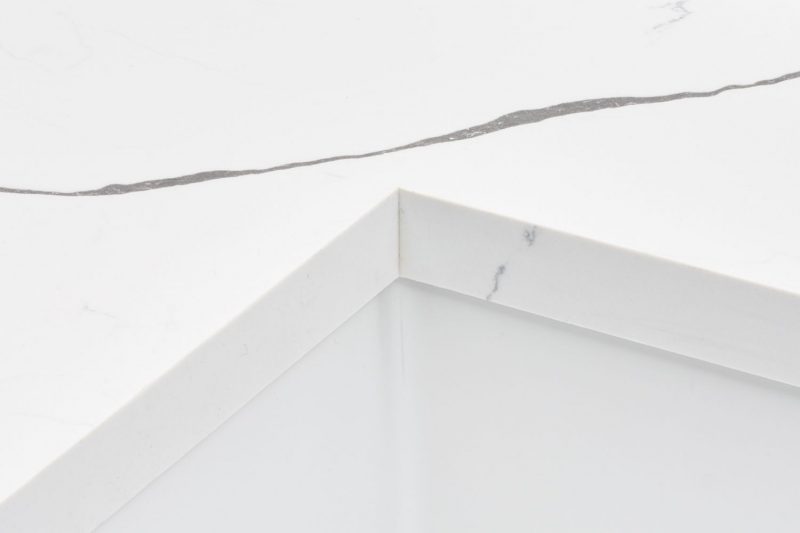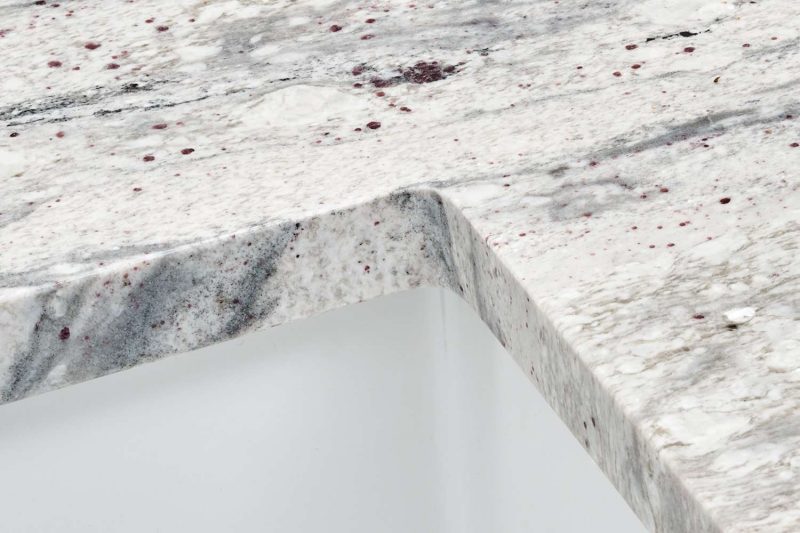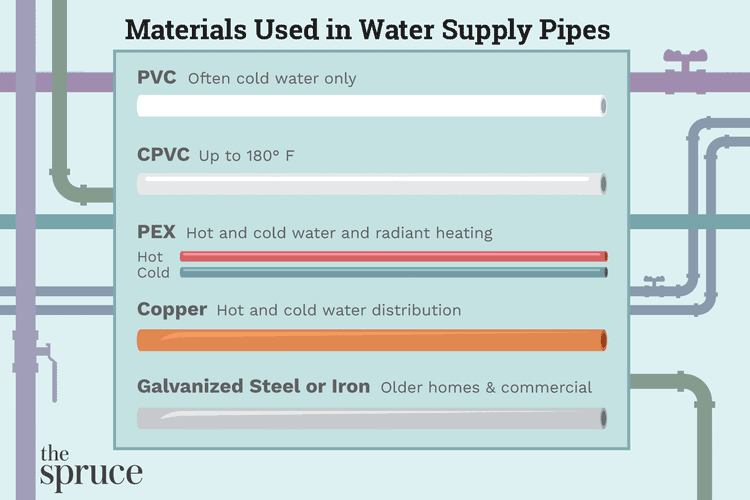When selecting countertops for your bathroom or kitchen, you might find yourself deciding between two popular options: quartz and granite. At first glance, it can be difficult to differentiate between these two materials. Both quartz, which is an engineered stone, and granite, a natural stone, are solid and have comparable price ranges. However, factors like their composition and maintenance requirements could influence your choice. Discover the key differences between quartz and granite countertops to determine which is the right fit for your needs.
:max_bytes(150000):strip_icc()/quartz-vs-granite-countertops-1822078_hero_10840-670767cd7112497d8e517f80837d253e.jpg)

Contents
Appearance
Quartz countertops, being a man-made product, offer a more consistent look compared to granite countertops. They come in a wide range of colors and distinctive patterns. While quartz is typically designed to mimic the look of natural stone, it is also produced in styles that do not resemble stone at all.
Granite countertops possess a distinctiveness since each slab is one-of-a-kind. The variations in mineral patterns and hues ensure that your countertop is truly unique. Authentic natural granite showcases striking veining that cannot be replicated in quartz.
Tip
Large pieces of granite are sliced into consistent dimensions using diamond wire saws or gang saws. As a result, neighboring slabs can appear quite alike. The cutting process for each slab typically requires six to seven hours.
Selecting between quartz and granite ultimately comes down to individual taste. If you desire the appearance of genuine stone, granite is the way to go. However, numerous individuals believe that quartz countertops provide a sufficiently similar aesthetic to natural stone.

Cost
Granite and quartz are both top-tier, expensive options for countertops. If you’re working with a limited budget, it may be more practical to consider solid surface or laminate countertops.
The price of quartz countertops typically falls between $50 and $75 per square foot, while high-end options can reach up to $200 per square foot. Additionally, installation can add another $10 to $30 per square foot. As quartz has gained popularity and become more accessible, the prices for standard countertops have decreased, although distinctive designer styles and colors still attract premium prices.
The installation of granite countertops ranges from $40 to $100 per square foot. Variations in pricing are influenced by the selected style and the specific edging treatments desired.
The cost of both types of countertops differs due to the fact that the materials are imported from abroad. These products are transported via container ships across the oceans, which is influenced by the fluctuating prices of petroleum, contributing to the high prices of quartz and granite. Additionally, tariffs and various other factors play a role in determining the overall pricing.
Ecological Consequences
Both types of countertop materials primarily consist of natural elements. Granite countertops have a slight edge as they are composed entirely of stone, whereas quartz countertops are made from a combination of natural materials, color pigments, and polymer resins that hold the components together.
In contrast, granite countertops necessitate extraction from quarries, whereas quartz countertops are primarily produced from recycled stone materials, eliminating the need for quarrying.
Concerns have been raised about radon emissions from granite countertops. Nonetheless, recent research indicates that granite and engineered stone countertops emit minimal to no radon. According to the Environmental Protection Agency, it is improbable that radiation from granite countertops would elevate annual radiation exposure beyond typical natural background levels.
Suitability for DIY Projects
Neither quartz nor slab granite are suitable for DIY installation. These materials are quite heavyfor instance, a modest 36-inch countertop can weigh around 100 pounds. Additionally, cutting and drilling quartz and granite requires specialized tools, making it challenging for those using standard equipment. It’s advisable to hire a professional for the fabrication and installation of your countertop.
Take on your countertop renovation projects with the help of an expert.
Not everyone can be an expert. Discover and evaluate estimates from highly-rated specialists in your area.
Maintenance
- Sealing: Granite is a stone with a certain level of porosity, necessitating a sealant application during installation and regular maintenance sealing thereafter. In contrast, quartz is not subject to sealing requirements due to the resins incorporated during the slab manufacturing process.
- Staining: The resins found in quartz countertops enhance their resistance to stains significantly more than that of granite.
- Bacterial resistance: The surface of quartz is less prone to harboring bacteria due to the resins that create a less porous material compared to granite.
Durability
- Heat tolerance: While both materials are recognized for their heat resistance, granite can endure significantly higher temperatures compared to quartz. It ranks among the most heat-resistant options for countertops. You can set a hot pot or pan directly on granite without immediate damage, whereas quartz may suffer from scorching. This characteristic is also relevant in bathrooms, where hot styling tools are often placed on countertops.
- Cracking: Granite slabs can possess natural imperfections that increase their susceptibility to cracking. In contrast, quartz is consistent in composition, resulting in a lower likelihood of cracking due to such inherent defects.
- Extreme temperature fluctuations, such as rapid transitions from high heat to cold, can lead to cracking in granite, although this occurrence is rare. In contrast, quartz is more susceptible to cracking when its surface is abruptly subjected to significant temperature changes.
The Ruling
Quartz and granite countertops are both high-quality materials that elevate the experience of kitchens and bathrooms while also increasing the home’s resale value for the future.
In comparison to laminate, solid surface, or ceramic tile countertops, granite and quartz are often regarded as desirable options for kitchens and bathrooms.
Granite attracts those who appreciate natural materials and are willing to perform occasional resealing. On the other hand, quartz countertops provide simpler upkeep and somewhat enhanced durability, though they lack the distinctive appearance that granite provides.
Leading Brands
Quartz Countertops
Here are some of the leading brands in the quartz market:
- Cambria
- Caesarstone
- Daltile ONE Quartz surfaces
- Dekton from Cosentino USA
- DuPont Corian Quartz is a premium surface material known for its durability and aesthetic appeal.
- LG Viatera Quartz countertops
- PentalQuartz from Architectural Surfaces
- Cosentino USA’s Silestone
- Vicostone Engineered Quartz Surfaces
Granite
These firms are recognized as leading names in the granite industry:
- Arizona Tile is a company that specializes in providing a wide range of tiles and natural stone products.
- DaVinci collection from DalTile
- Levantina
- MSI Surfaces
- Omni Surfaces
- Sensa from Cosentino
- Triton Rock
Which material is superior for countertops: quartz or granite?
Quartz and granite are both excellent choices for countertops. The primary distinction between granite and quartz countertops lies in their makeup. Granite countertops are entirely natural solid stone, containing no additives apart from surface sealers. In contrast, quartz countertops are engineered, consisting of crushed quartz, various minerals, and resins.
Is quartz pricier than granite?
Quartz may be priced a bit lower than granite, yet their costs are generally viewed as comparable. Both are regarded as high-end materials, priced higher than other types of countertops.
What are the drawbacks of quartz countertops?
The sole drawback of quartz is the potential for the resin within the material to melt when subjected to sudden and intense heat.

